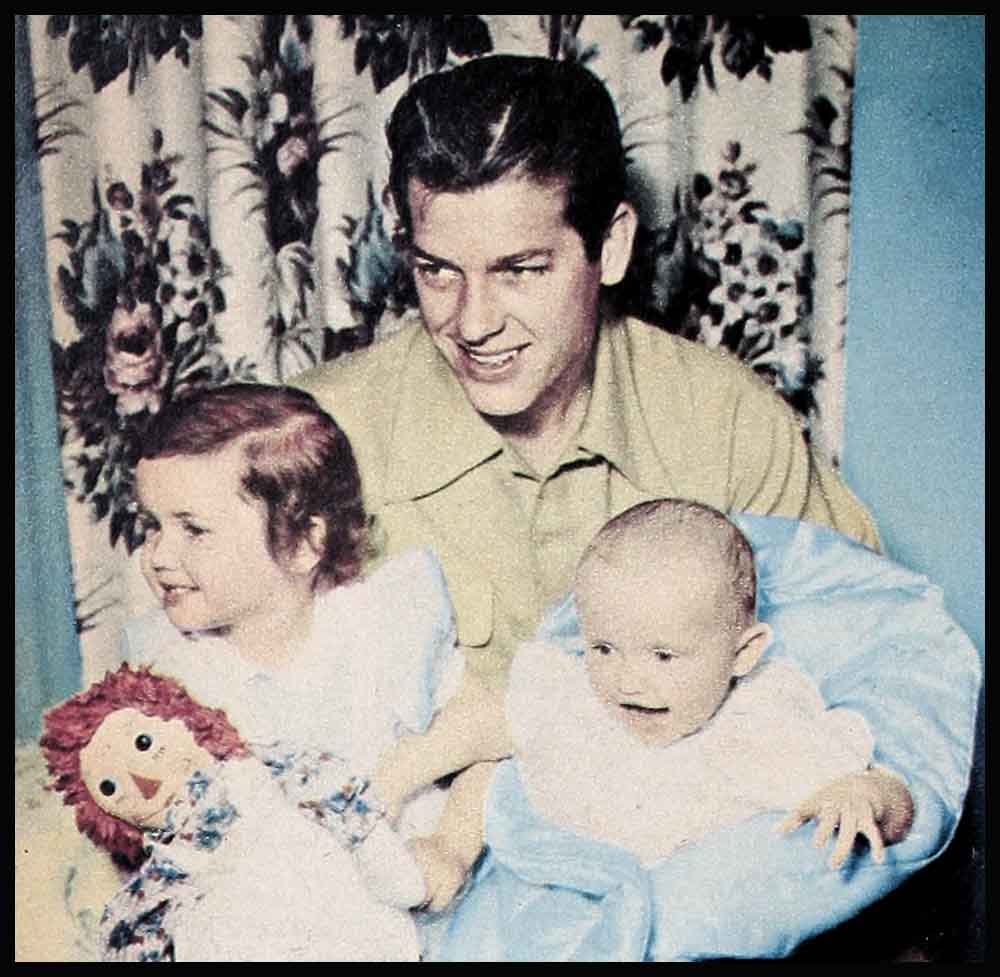
Life With Fathers
Nobody will gainsay the fact that Father is a mighty important guy throughout the world. His word is law in the household even though Mother may be the real power behind the throne and what he rates from his children ranges on a sliding scale from awe to affection.
But in Hollywood Dad is virtually terrific. Oh, he may have his individual attitude, that of stem father or indulgent dad, and in this respect he falls into the categories of fathers everywhere. But there his resemblance to the general male parent stops. For right there he begins to take on glitter, become a super-parent, a super-male, famous, rich and awe-inspiring.
Such a dad may not overwhelm his wife, his public or his producer, but to his children he is regarded as a god, but literally.
For example, consider these very true tales of Hollywood’s cutest tots.
The most rabid version of the mutual admiration society of daughter and father is Roy Rogers. Roy, who is the greatest single contributor to the success of Republic Studio’s current tenth anniversary, is adored by kids all over the country and his daughter Cheryl is no exception. He and his wife had given up hope of having a youngster of their own and had adopted Cheryl when they found a baby was on the way to them. Cheryl was discovered by Roy while he was on tour when she was less than six months old. She’s five and a half now, all of which time they have been separated scarcely a moment. Wherever Roy goes, there goes Cheryl even right up to and in front of the camera. She has her own Shetland pony with markings just like Roy’s Trigger and she rides it in an outfit which is a duplicate of Dad’s. Baby Linda Lou, three years old, is too young to do more than be held on a horse, but she, too, has her own pony and cowboy outfit. Both youngsters are so devoted to their father that his slightest wish is their most delightful command, so no further ordering is ever necessary.
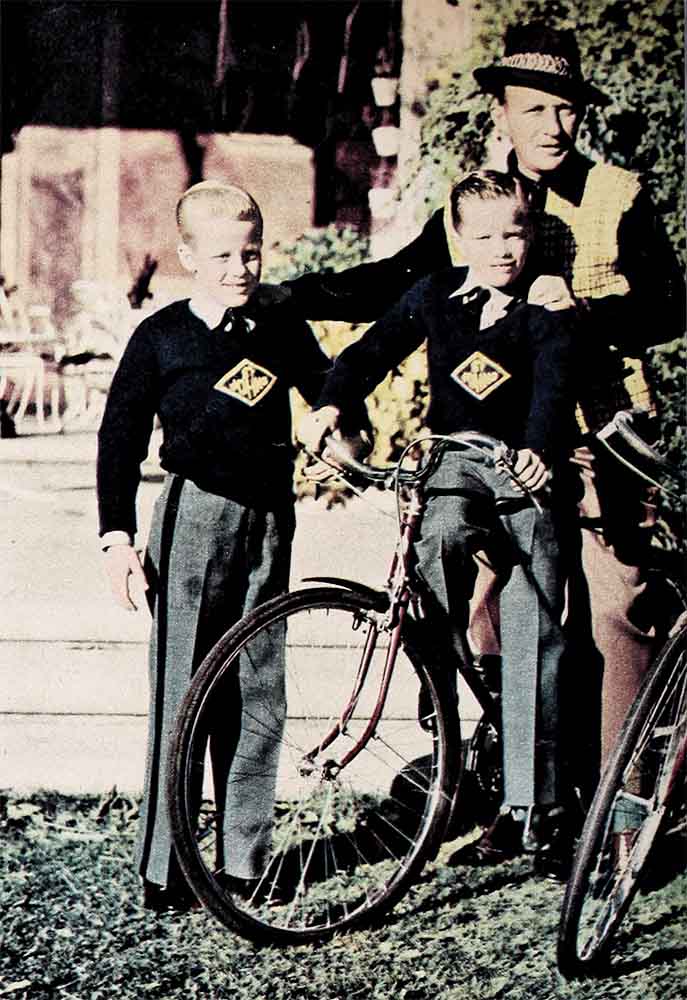
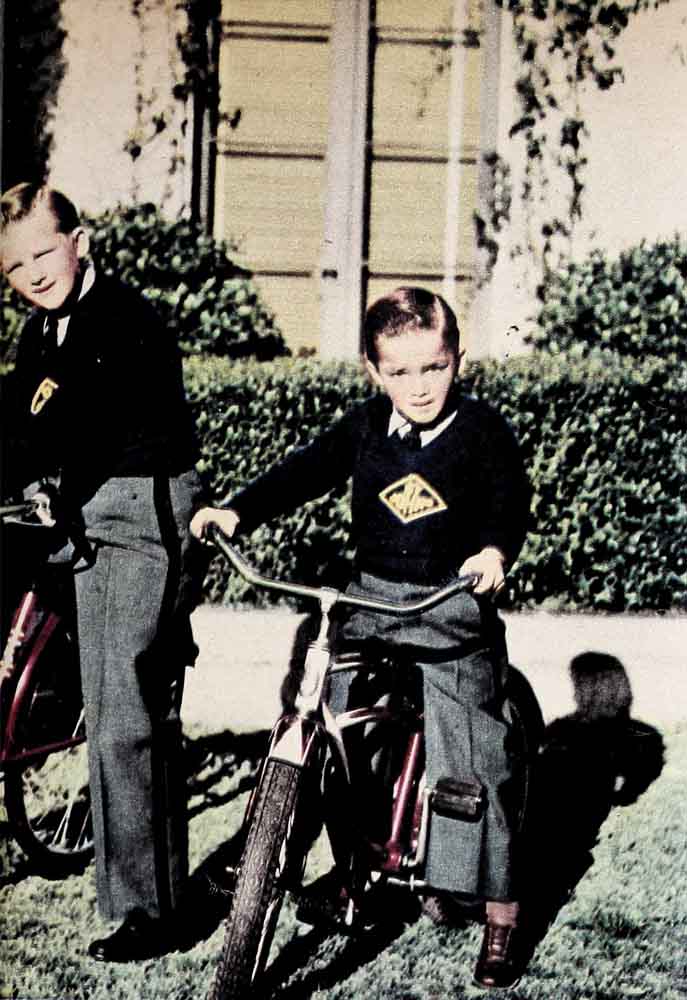
Danny Milland’s father-adoration comes under a different heading. In fact he has his “Fathers” a bit mixed up. He was saying his prayers reverently over his lovely mother’s knees. “Our Father who art in Heaven,” he said. He stopped quickly, looked up at Mel, put his head down again. “Our Father who art in New York,” he amended.
Mother Mel had a time explaining.
Alana Ladd sees her parent in her prayers, too, but differently. Alana easily shrugs off the orders of nurses and her mother, Susie, but has learned through smarting experience just above the back of her knees that when Pop issues orders, she’d better heed them. But imagine how Alan felt when he heard her saying in her prayers when she’d found it more comfortable to stand than to sit, “God bless Mama and Daddy, what Daddy wants Lonny do, Lonny do, poor Lonny. Amen.”
Then there is Norman Barnes Powell’s belief that Dick Powell did perform a miracle. It was back in those happier days when Dick and Joan Blondell were so contentedly married and had just ushered tiny Ellen Powell into the world. Dick undertook to tell Norman about it.
Norman rushed to the phone and called Joan in the hospital.
“Mother, you’d better come home right away,” Norman gasped. “Father has just given birth to a baby girl.”
Dana Andrews, a minister’s son, is a stern father, very proud, very devoted, but a sharp disciplinarian, nonetheless. He has three children, David, eleven (by Dana’s first wife, who died), Kathy, two and a half and Stephen, four months.
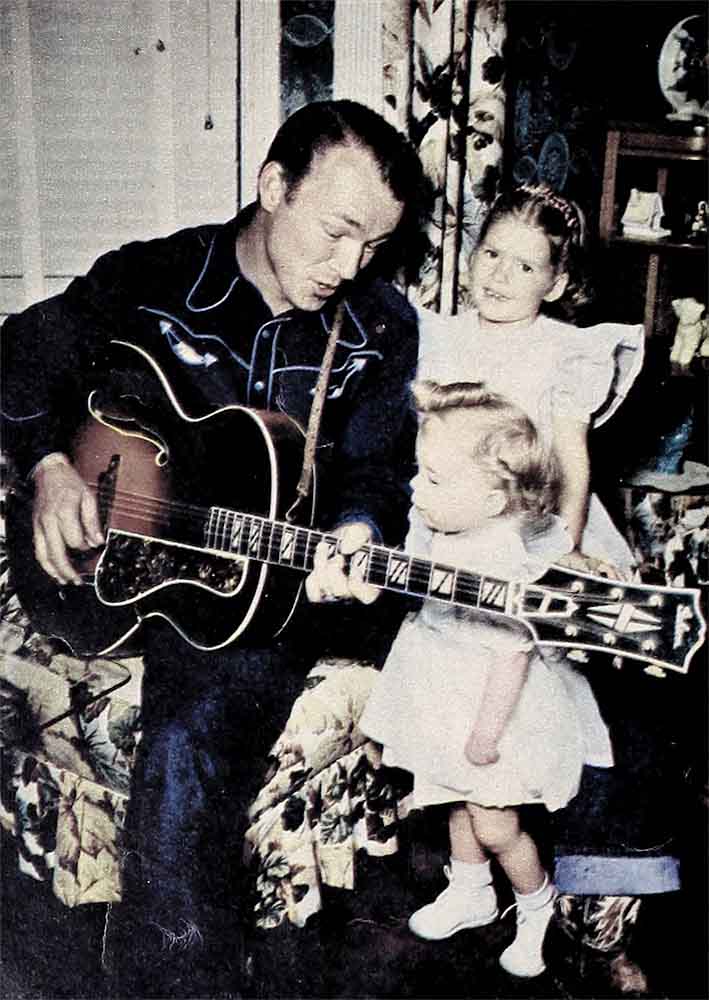
Dana, himself, is one of nine boys. He was brought up with a maximum of discipline and spankings. In fact, he was spanked every Wednesday almost from the day he could walk. The reason for the Wednesday swacks was his running away from prayer meeting to go to the movies. It is because he recalls these spankings that he doesn’t spank his own kids. He believes, judging by experience, that spanking does no good. He disciplines his own children by taking away privileges, when they are naughty, or by giving privileges when they are good. These methods, so successful with David, have a different effect on Kathy.
She succeeded in getting even with her dad by embarrassing him in public. It all came about through “Little Black Sambo.”
This is Kathy’s favorite book and almost every night her father reads to her from it. No matter how late Dana gets home from the studio, Kathy seems to sense it, opens a hitherto sleep-weighted eye and says, “Daddy read,” and inevitably, no matter how weary, Daddy does.
Recently the Andrews family was in Los Angeles’ big, crowded Union Station and there, for the first time in her brief life, Kathy saw a little Negro boy.
“Sambo,” she whooped and took after him.
The little Negro boy had apparently led a sheltered life, and had not been pursued by girls, and not knowing what might be in store for him, took to his heels, too. Around and around the children went, dodging under elbows and between knees, falling over suitcases, bowling over porters. Dana couldn’t possibly get through the crowd that fast. Neither could the little Negro boy’s alarmed, portly mother.
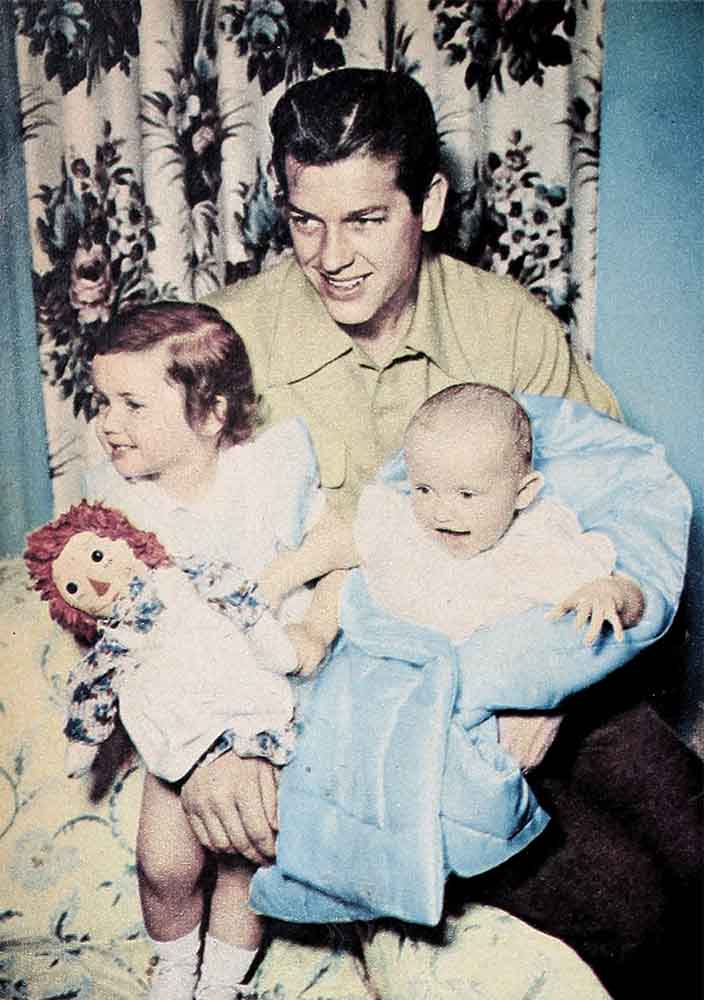
They finally all caught up with one another and apologies were offered, but Kathy doesn’t understand yet why Daddy was both sore and laughing fit to kill.
It was like what happened to Susie MacMurray, one of those moments that bewilder the young.
Susie is a dreamy child, who adores her daddy Fred, who dotes upon her in return. She is automatically obedient as Fred forgot, to his embarrassment, one day when he and Lilly were entertaining.
Their guests had never met Susie and Fred wanted to show her off, so he called upstairs, “Susie, come here right away, will you, dear?”
“Yes, Daddy,” said Susie, and come she did, right away and just as she was, which was as naked as a very little jay bird.
At Brian Donlevy’s house Mama metes out the punishment while Daddy can’t resist the tiniest baby appeal. Little Judy knows perfectly that Daddy is a sucker for her, racing home from the studio to read her bedtime stories, and almost always bringing her a present. She doesn’t know that on all sets where extras are used, there are always old women knitting things, preparatory to selling them overpriced to soft-hearted stars, but Brian knows it, and the old ladies know all about Brian. They pray to be assigned to Donlevy pictures and knit like crazy, when they are, knowing Brian is good for a ten-spot for any tiny, hand-knit sweater, or woolly knitted dog. Brian, baffled that Judy seems to make way with so many sweaters and dogs, brings same proudly home all the time.
Did he but know it, the cause of the high mortality on these gifts is his charming wife. She. knows Judy can’t wear a third of the sweaters and could be spoiled playing with so many toy dogs. So she distributes them to other less fortunate children. She doesn’t tell Brian to stop bringing more home, however. She knows that would do no good.
Nancy Sinatra is one child who is quite blase concerning her father and fame.
The Voice was very much asleep in the security of his own bed one Sunday morning when a series of girlish giggles woke him. He opened one cautious eye and saw, there at his bedside, not bobby-soxers but an even younger generation, his daughter’s generation, to be exact about it. The children were standing open-mouthed, looking down upon Frankie—that is, all save Nancy. She was announcing, in the most sated voice, “Yep, that’s him.”
Monica Elizabeth Henried gets away with murder with her doting father. If you don’t believe it, think of her turning the suave Paul—whom she calls Papa Pauli—into a trained seal, but honestly! Think of this ex-Viennese great lover liking to be turned into a trained seal.
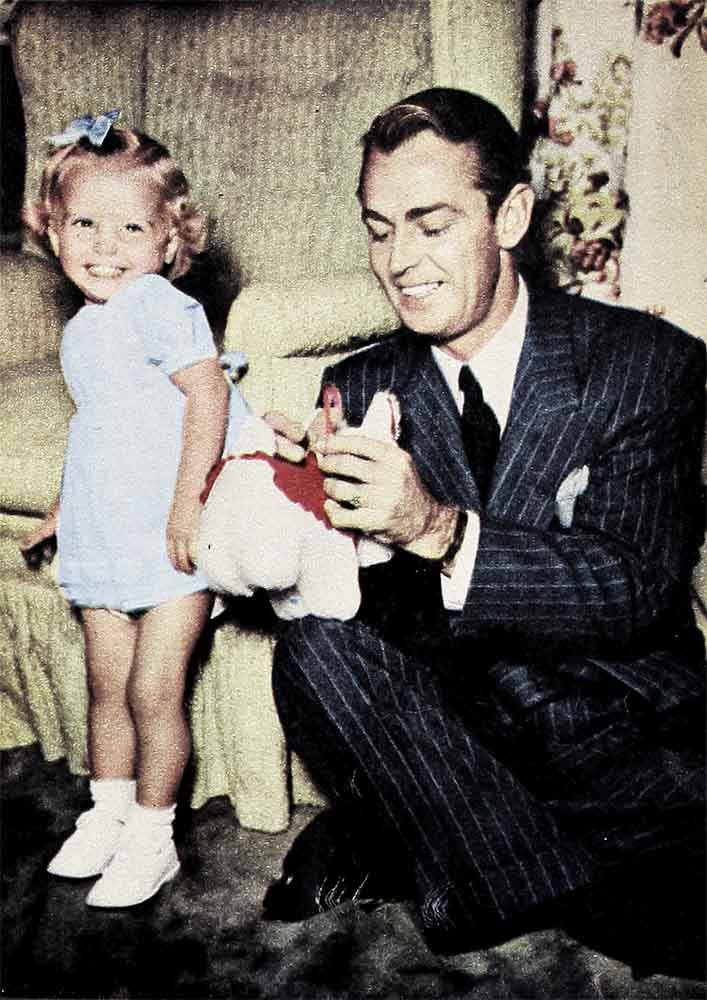
Monica Elizabeth was adopted by Paul and his pretty wife Lisl from an American family but she is being brought up with love and kisses in the warmest Viennese-American-Californian blend by Lucy, the same nurse Lisl had as a child.
One afternoon the Henrieds went to the beach. There w as the wonder seal! all the way home Monica Elizabeth could talk of nothing else. After that, all that had to be done to make her behave was to say she could go to see the seal.
Then winter came. The seal went away. Monica Elizabeth was inconsolable until Lisl, who used to be a very fine costume designer, thought to design a home-made seal for the baby. That was terrific except that the seal was inanimate and right there Papa Pauli got pressed into service. He had to get in back of the seal and make it go through its paces. He still has to do it, almost every night, and he adores it.
When it comes to absolute pushover fathers, Jim Brown wins the sweepstakes. There are two small daughters in the Brown home—Beverly Jean, the eldest who is just past two, and Carol Ann who is ten months. No discipline sticks around Jim. Mrs. Brown can order one thing and try to enforce it, but let Jim come home and it is all a laugh to the little girls.
Jim chose the names for both of them, though Beverly Jean is called Wendy by the Browns. In case you don’t follow that it’s because she was called Windy by her parents during her first year. Jim says she has now outgrown that phase of her career, but the nickname stuck so he dignified it by calling her Wendy.
James Craig and his firstborn, generally called The Bub, are as close to one another as an echo to a convention hall. Jimmy’s favorite story about The Bub concerns the day that they brought the new baby home. Jimmy told The Bub about the great event and The Bub was exceedingly excited when the private ambulance stopped before their house.
He ran over and kissed his mother, then dashed to his father who was carrying a small satchel that contained no more important items than three-cornered pants.
“Is the new baby in there?”
“Oh, sure,” said Jim.
“Can I see it?”
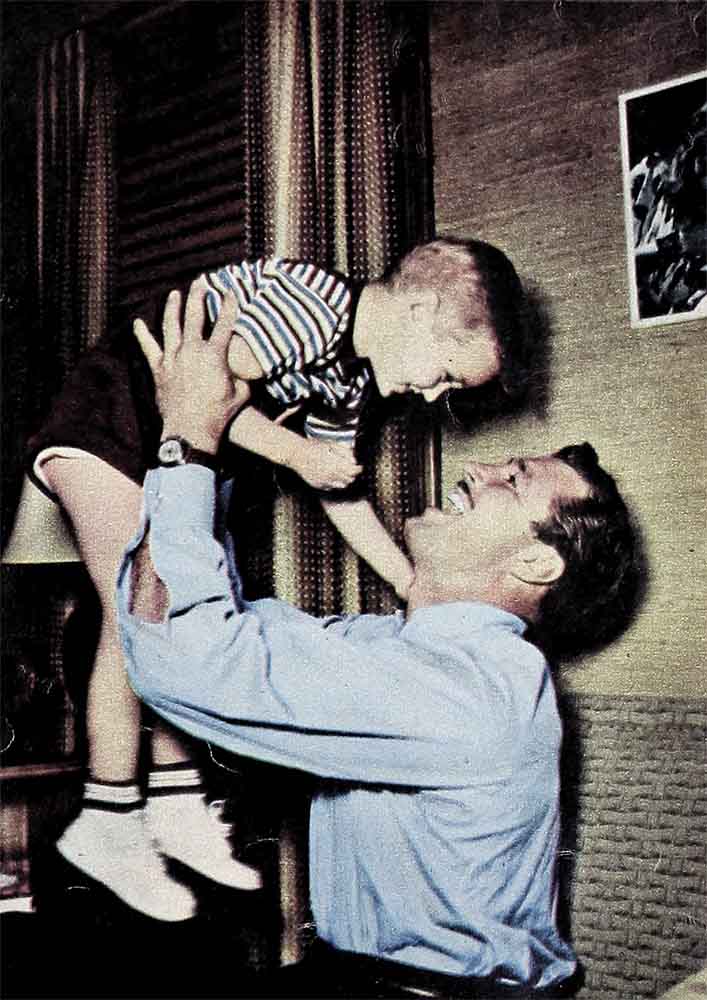
Jimmy had to stall. He said, “I can’t open the bag here, Bub. You see, the baby’s very new. It’s wild like a puppy.”
The Bub ran quickly into the house where he located his dog, took off the dog’s collar and fastened it to the leash.
“Here, Dad,” said The Bub, “put this on the baby. After all the trouble Mother’s been through, we don’t want the darn thing to get away.”
But finally, last and lustiest of all Hollywood’s progeny, come the Crosby boys. Just as there is no one quite like Der Bingle, so in the child-laden houses of Hollywood there are no kids that can surpass the Crosby kids. They are fast becoming as much a legend as the Groaner.
Only Bing, being the character he is, would have thought of The Birthday. With the coming of the war, Bing decided it was both patriotic plus a saving of family nerves for the lads to not have three birthday celebration a year (the twins, Dennis and Phillip being condemned to one birthday between them, anyhow). Thus Bingo, who swings from being stern to indulgent and back again, gave out with instructions that there was to be one birthday a year, and every fourth year, twins included, each boy had The Birthday as his very own. On his birthday that boy could not only invite whom he liked, but he could pick the date, the menu to be served and the games to be played.
The system actually works. Last summer, for example, The Birthday belonged to Lindsay, the youngest. He chose the day after school closed as the date, announced that he was having fifty-five all-male schoolmates, plus the family. He demanded that each boy attending should be given a gift, not merely get one taken from him, and he insisted that the Crosby terrors be allowed to pick out these gifts themselves. Bing okayed the whole deal.
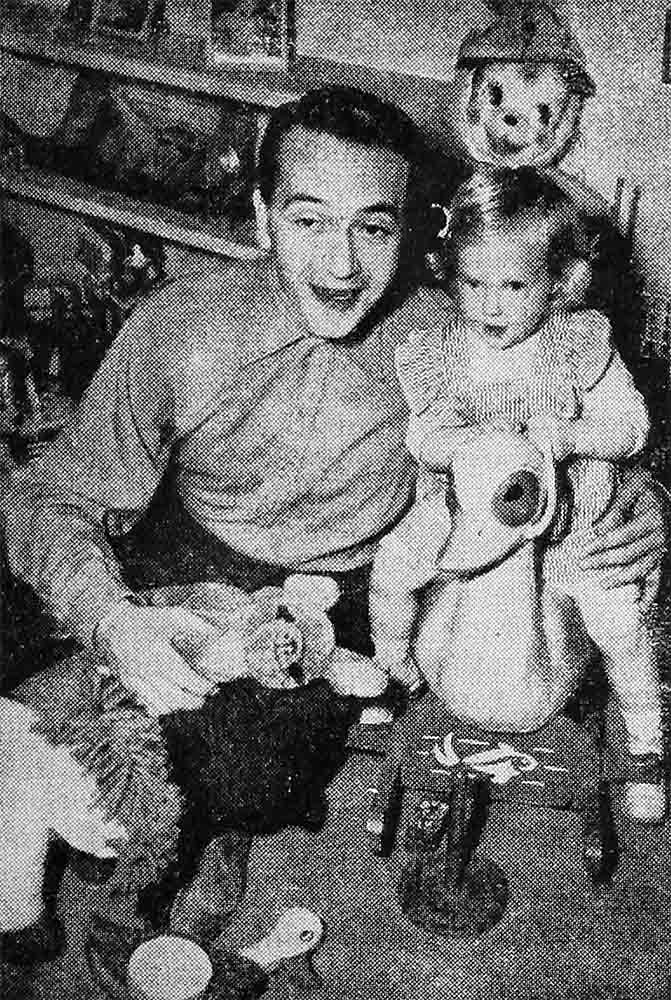
The result was a barrage of such man-killing, noise-making implements as have never before (or since) rent the rarefied air of Beverly Hills. At the height of the din, when Dixie Crosby was beginning to go mad, when the neighbors on all sides were telephoning the police, when the maids were threatening to quit, El Bingo walked composedly in. He proposed to the fifty-nine limbs of Satan that they learn the words of “Swinging On A Star.” He said, in fact, that if they’d learn the words, he’d sing a duet with the lot of them—not only that, but he’d give each boy a platter of said duet as a memento of the day.
They fell for it. They listened. They learned. And finally, with the most popular voice in the world leading them, they lifted their voices in song like cherubs.
The mere thought of having their own personal Crosby recording, with themselves as supporting artists, made Bing, as Father, a really terrific guy. He became a super-parent, super-male, handsome, rich and awe-inspiring. He became, you see, exactly what we told you Hollywood fathers were in the first place.
THE END
It is a quote. PHOTOPLAY MAGAZINE JUNE 1945




